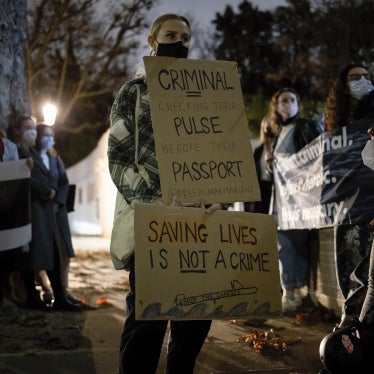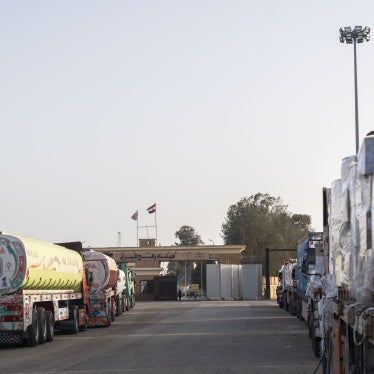(Paris) – President François Hollande of France should publicly and privately convey concerns about deteriorating human rights conditions in the United Arab Emirates (UAE) on his visit there. Hollande is scheduled to arrive for his first official visit to the UAE on January 15, 2013.
Since the beginning of the Arab uprisings, UAE authorities have demonstrated their intent to silence critics and anyone pressing for political reforms, Human Rights Watch said. In addition, migrant workers constructing a high-profile project that will include a branch of the Louvre have been exploited and their rights ignored. The UAE has resisted reforming its policies for migrant workers, who make up over 80 percent of the population.
“Hollande’s first visit to the UAE should not ignore the seriousness of the crackdown on pro-democracy activists and the shameful situation for migrant workers,” said Jean-Marie Fardeau, France director at Human Rights Watch. “Economic and military interests should not lead France to be quiet on fundamental rights it claims to defend in other parts of the Arab world, in particular in Syria.”
Hollande, who will be accompanied by The Louvre Museum’s chairman, Henri Loyrette, should seek public guarantees from government officials on working conditions for migrant workers who are building The Louvre Abu Dhabi. The museum is to be situated on Sadiyaat Island, the country’s most high-profile construction project, along with a branch of the Guggenheim Museum and a New York University campus. However, unlike New York University or the Guggenheim, the Louvre has made no public commitment on workers’ rights.
Despite years of criticism, the UAE has failed to address the shortcomings in its legal and regulatory framework that facilitate the serious exploitation of migrant workers.
With the announcement on January 18 that a UAE construction firm will build Le Louvre Abu Dhabi in time for its scheduled opening in 2015, Loyrette needs to press the Emirati authorities for public assurances on key issues, Human Rights Watch said. Hollande should back him up.
On October 26, the European Parliament issued a public criticism of the UAE in a resolution in which it expressed “great concern” over the crackdown on its domestic critics. In response to a question on this human rights resolution, a spokesman for the FrenchMinistry of Foreign Affairs stated, “For our part, we are well aware of the progress made by the UAE in this field and we trust the UAE authorities to continue along this path.”
“If President Hollande is to avoid accusations that France has overlooked serious and fundamental human rights violations in a country where it is pursuing defense contracts and oil concessions, he needs to offer public criticism of the UAE’s crackdown on domestic critics,” Fardeau said. “President Hollande also needs to seek public assurances from the UAE on the rights of the migrant workers who will build the Abu Dhabi branch of France’s national museum.”
For more informations on the points Hollande should raise in terms of human rights in the UAE, see below.
During his visit, Hollande should address several key issues:
Freedom of Expression
The UAE’s crackdown on domestic critics and their right to free expression began in March 2011, when 132 Emiratis signed a petition requesting full election by universal suffrage and law-making powers for a key branch of the UAE government, the Federal National Council. This led to a number of high-profile arrests and prosecutions in 2011 for “insulting” the country’s rulers.
The repression of freedom of expression and association and crackdown on proponents of reform has continued. In November 2012, the UAE issued a new federal decree on cyber-crime, which poses a serious threat to the freedoms of peaceful activists and ordinary citizens alike.
Arbitrary Detention and Torture
Sixty-six people with ties to the Islamist group al-Islah have been detained without charge, some since December 2011. The detainees include prominent human rights lawyers, judges, teachers, and student leaders. The location of 64 of the detainees remains unknown and on the rare occasions that the detainees have appeared in court, where their detention was extended, witnesses reported that they appeared disoriented, distressed, and disheveled.
Separately, Human Rights Watch has received numerous credible allegations of torture at state security facilities, including of two Syrian nationals.
Harassment, Deportation of Lawyers
Employees of the Emirati lawyer who is offering the 66 Emirati detainees legal assistance have been subjected to a campaign of harassment and intimidation. Authorities have deported three of his foreign employees since 2011.
Harassment, Deportation of Human Rights Defenders
Ahmed Mansoor, a member of Human Rights Watch’s Middle East advisory committee, spent seven months in prison in 2011 for “insulting” the country’s rulers. Since his release, he has been assaulted twice, apparently premeditated attacks by people with knowledge of his movements, and he has been the subject of a smear campaign and threats on his life. The authorities have failed to thoroughly investigate any of these incidents.
On July 18, the UAE deported a political activist working for the rights of the stateless bidun to Thailand, apparently on account of his calls for reform.
Migrant Workers’ Rights
The UAE has resisted reforming a legal and regulatory framework that facilitates serious exploitation of the country’s migrant workers. In September an independent monitor at Saadiyat Island reported serious ongoing problems, including that the majority of workers were still paying fees to recruitment agents, in violation of UAE law. Female domestic workers remain acutely vulnerable to serious abuses by their private employers and are not even afforded the minimal protection granted by national labor law. A new draft law on domestic workers has yet to be implemented and contains numerous troubling provisions.







